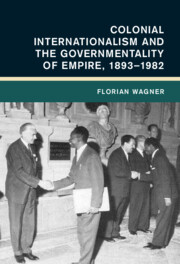Book contents
- Colonial Internationalism and the Governmentality of Empire, 1893–1982
- Global and International History
- Colonial Internationalism and the Governmentality of Empire, 1893–1982
- Copyright page
- Dedication
- Contents
- Figures
- Acknowledgments
- Abbreviations
- Introduction
- 1 “More Beautiful than the Nationalist Thought”?
- 2 A Transcolonial Governmentality Sui Generis
- 3 Politics of Comparison
- 4 Cultivating the Myth of Transcolonial Progress
- 5 The Adatization of Islamic Law and Muslim Codes of Development
- 6 Creating an “Anti-Geneva Bloc” and the Question of Representivity
- 7 Inventing Fascist Eurafrica at the Volta Congress
- 8 False Authenticity
- 9 “That Has Been Our Program for Fifty Years”
- Conclusion
- Bibliography
- Index
1 - “More Beautiful than the Nationalist Thought”?
Colonialist Fraternization and the Birth of Transnational Cooperation
Published online by Cambridge University Press: 14 January 2022
- Colonial Internationalism and the Governmentality of Empire, 1893–1982
- Global and International History
- Colonial Internationalism and the Governmentality of Empire, 1893–1982
- Copyright page
- Dedication
- Contents
- Figures
- Acknowledgments
- Abbreviations
- Introduction
- 1 “More Beautiful than the Nationalist Thought”?
- 2 A Transcolonial Governmentality Sui Generis
- 3 Politics of Comparison
- 4 Cultivating the Myth of Transcolonial Progress
- 5 The Adatization of Islamic Law and Muslim Codes of Development
- 6 Creating an “Anti-Geneva Bloc” and the Question of Representivity
- 7 Inventing Fascist Eurafrica at the Volta Congress
- 8 False Authenticity
- 9 “That Has Been Our Program for Fifty Years”
- Conclusion
- Bibliography
- Index
Summary
Chapter 1 explains why colonial lobbyists founded the ICI in 1893 and why over 200 colonial experts from thirteen countries joined the ICI during a period of tense imperial rivalry. Their internationalist efforts were in the context of severe criticism of colonialism in the 1890s due to losing money for colonizing countries. After non-governmental colonial interest groups initiatied the ICI, governments and colonial administrations soon started funding it. They thus showed their esteem for its transnational agenda, which promised a quick and cheap economic development of overseas possessions. While in the early period of the ICI’s existence, emulation of other colonial powers still aimed at nationalist competition, colonial experts learned quickly how to capitalize on superior colonial methods developed through transnational exchange. Unveiling this transnational cooperation, this chapter shows how the ICI marginalized the nationalist branches of the colonial movements in Europe and even took diplomatic action to prevent colonial powers from going to war, which would pose a threat to their colonial project. Ultimately, most colonial experts turned to colonial internationalism to save the colonial project that earned them a living. By 1914, most colonizing countries brought their policies in line with the best practice propagated by the ICI.
Keywords
- Type
- Chapter
- Information
- Publisher: Cambridge University PressPrint publication year: 2022

